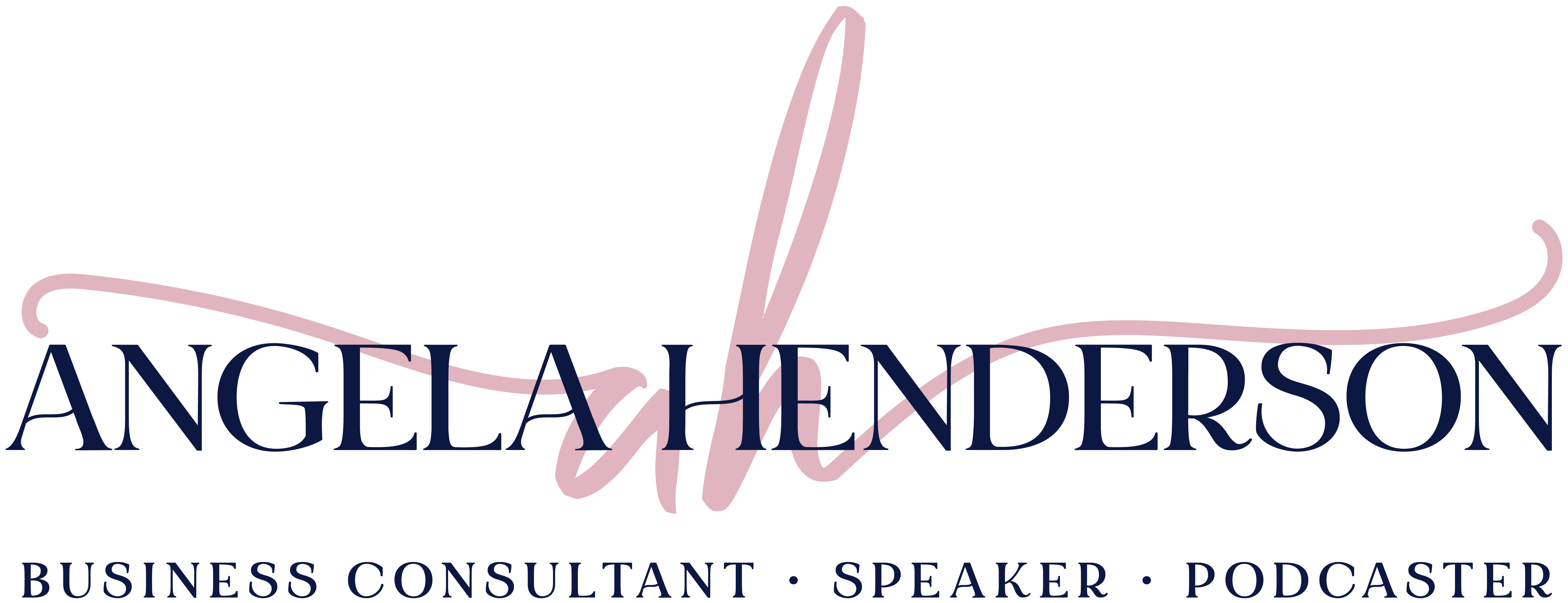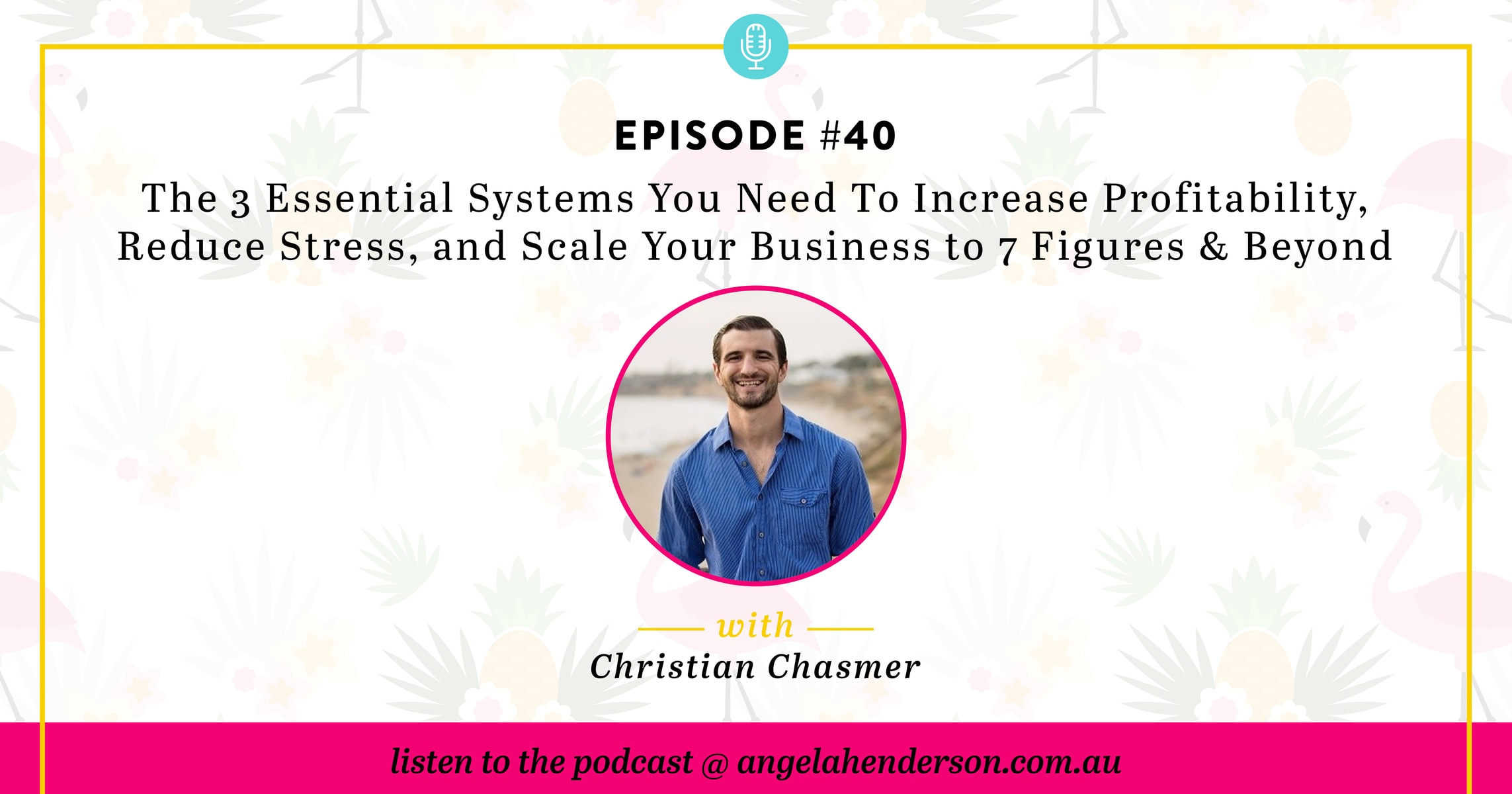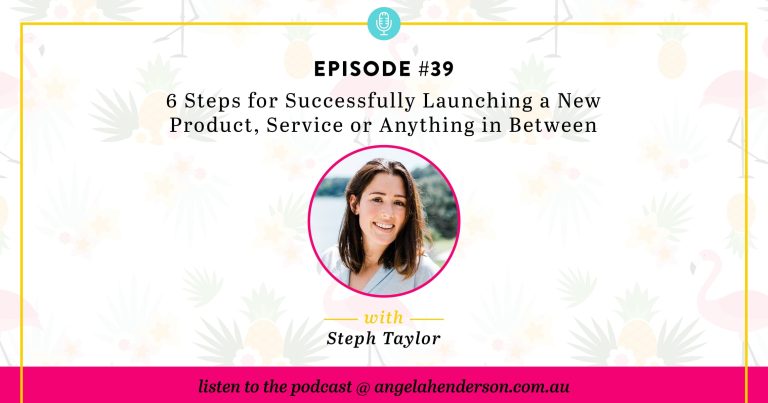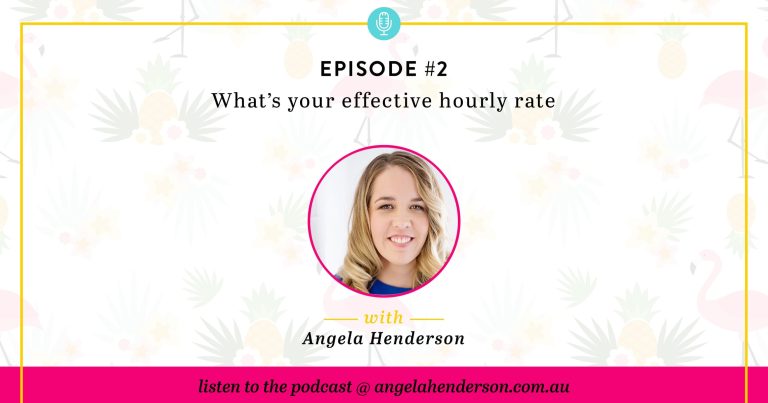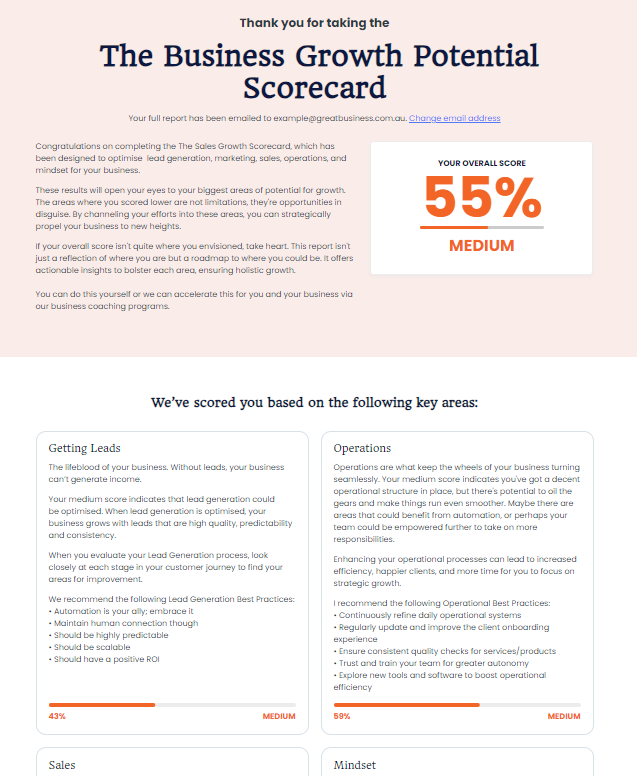Putting systems in place is the best thing you can do for your business to start scaling up. In Episode 40 of the Business & Life Conversations Podcast, Christian Chasmer, Founder of Elevate Advisors shares his success story with us and gives us valuable information on leadership and the importance of systems in a business. He imparts with us the top three essential systems to put in place for your business today and disproves the most common limiting beliefs that may hold you back from putting these systems in place.
Important Links Mentioned in the Show:
Angela Henderson Active Business Facebook Group
Angela Henderson Facebook Business Page
Prefer to read The 3 essential Systems You Need to Increase Profitability, Reduce Stress, and Scale Your Business to 7 Figures and Beyond? Here’s the transcript:
ANGELA:
Hey there, you’re listening to the Business and Life Conversations podcast, my name is Angela Henderson, and on this show we talk about improving your business, life or both. By having amazing and rich conversations with brilliant guests. Who will inspire you and who will give you tips and tricks, to help you grow both in life and in business.
Hello, hello. Christian, welcome to the show. I’m super excited to have you on today.
CHRISTIAN:
Yeah. Thanks for having me. I’m excited as well.
ANGELA:
Gosh, it’s going to be awesome. As we were talking prior to this recording, you’re over in San Diego, which is always a beautiful place to visit. What’s the weather like over there today?
CHRISTIAN:
It is 80 and sunny, as usual.
ANGELA:
Dude, you have to love that. I think San Diego reminds me of a lot of.. I live in Brisbane, Australia, and for most of the year, you live a pretty good life with, I mean, we’re lucky with the weather. We’ve got water really close by. The beaches are right there. We’re about an hour away here in Brisbane. I love San Diego. It’s a beautiful place. Have you done much travelling? Have you ever been over to Australia before?
CHRISTIAN:
I have, actually. Yeah, I actually learned to surf for the first time in Manly Beach.
ANGELA:
Okay, yep. That’s down where, actually, my business coach is James Schramko from Super Fast Business, and he lives down in Manly Beach, and he is also an avid surfer, so it must be the place to go and learn to surf, I take it.
CHRISTIAN:
Apparently, so. Yeah, that must be it.
ANGELA:
Too easy, now today we’re talking about all things systems, which I think is imperative for businesses. But before we dive into the systems, I’d love for you just to tell the audience that is listening today a little bit about who you are, where you’re from, what you do. I’d also love for you to share what your favourite all-time movie is and why?
CHRISTIAN:
All-time movie and why? Yeah, I can start with that one. My all-time favourite movie is Gladiator with Russell Crowe. Always been my favourite movie since I was a little kid. I love history. I love Roman history specifically. The story, it just.. I don’t know. Since I was a very, very little kid, I used to watch that on repeat, and I still love Gladiator.
ANGELA:
Gladiator, all the way for you, for the win. Again, I guess, like you say, you watched it in your childhood, so there’s some memories there that also, obviously, stick. Was there any big key takeaway that you liked from the movie?
CHRISTIAN:
Oh gosh. Key takeaway? Just keep going. Just keep going. He was so resilient the whole movie. He just kept battling out of really, really tough situations. So, I just love that part of it.
ANGELA:
Awesome, of course. Tell those that are listening a little bit more about you Christian, what your background is, where you’re from. A little bit more about the business so that we can get to know you a little bit more.
CHRISTIAN:
Yeah, for sure. I grew up in a really small town in New Jersey and it was such a small town, I didn’t really know what entrepreneurship or personal development was. I thought personal development was going to the gym and working out. I thought entrepreneurs were these mythic beings and if you ever wanted to get out of the town and make money, you either became a lawyer or a banker, and that was really it.
That’s what I actually went to school for. I went to school to potentially be a lawyer. I was applying to law school junior year of college when I found entrepreneurship, if you will. There was a flyer on one of my classes, on the desk, and it basically said, “Run your own business. Make $10,000 over the summer.” And I said, “Man, I have $30 in my bank account. 10 grand? Sign me up, I will do anything.”
What it wound up being was an internship program where you ran your own franchise of an exterior painting business. Through that experience, I learned a ton about business and with sales, marketing, management, how to run my own crew. Most importantly, I learned two things. I learned, one, I loved entrepreneurship and that I was hooked. Two, I wasn’t a great entrepreneur or leader yet. I was pretty bad.
So from there, I started working on those two things and I equated entrepreneurship to leadership and systems. I built up that division to about 1.2 million dollars and then moved on to build a real estate development company in Boston, built that up moderately quickly and the same thing, using leadership and systems to do that.
Now I work on Elevate advisors, which we helped seven-figure entrepreneurs systemise their company and get the most out of their team, so that they can scale faster and really have more control over their revenue, time and results. I’m all about scaling your company and living your best life without sacrificing your life.
ANGELA:
Which is, again, something I think.. Especially for those in startup phases, there is an enormous amount of work that goes in and I think there’s.. The hours get away on us and sometimes I think we’re busy versus being productive. And I think, again, people don’t know what they don’t know. So systems are great and systems can start.. You don’t have to be in seven figures to need systems, you can start systems fairly early on in your entrepreneurship journey.
I’m all about foundations, so to me, systems are part of that overall foundations that you need in order to be able to grow and scale, either quicker or slower, depending on your business. So tell me, did you make the $10,000 that summer?
CHRISTIAN:
I did. I made $10,231 that summer.
ANGELA:
Oh my goodness, how cool is that? And then for your other business that you were talking about where you grew it to the 1.2 million, give us a time estimate. How long did it take you to grow to that revenue?
CHRISTIAN:
That was another division, basically young entrepreneurs across America, student painters, the internship program, I ran that for two years down in South Carolina where I went to school, and then after that, I approached the owner and I said, “Hey Steve, been doing pretty well down in South Carolina, I want to move up to Boston and start my own division from scratch. So, I want to train college students how to run their own businesses and coach them along their way.”
For whatever reason he said yes, so me and my business partner moved up to Boston, we started that division, and we did that and built it up to about 1.2 million dollars in about 10 months. So, it was pretty fast growth.
ANGELA:
Wow, that’s really cool. And again, you put it down to systems, which we’ll talk a little bit more about in a minute, but can you elaborate a little bit more about the leadership component? Because I think there’s such a broad definition of what makes a good leader, etcetera. So, I’d like to hear what your take is on that leadership definition.
CHRISTIAN:
I think the definition of leadership is somebody who can support and bring people around a vision and then empower them to execute on that vision. For me, a leader, really the question that I always ask myself is, “Who am I being? What type of person do I need to be for the people to follow me?” And early on in my career, I wasn’t being that person that people wanted to follow and I needed to change pretty dramatically in the personal growth, entrepreneurship level and worlds, to become the person capable of running a big business, but also become the person capable of having people actually follow their vision and their dreams.
ANGELA:
Would you say with the leadership, the leader that you’ve become, what does that look like now? What are those.. Or even go back a little. What did the qualities of.. What were you lacking as a good leader? Do you still have the same qualities now or have things slightly changed as you continued to grow as a person, but also as a business owner?
CHRISTIAN:
Yeah, great question. I always say my first year in business, that first summer where I made that 10,000, I was a very selfish leader, is what I always call it. I just put myself in a business and logic over the team and even the customers sometimes. I just thought that’s how business ran, it was my first time, I was ignorant. I was a little selfish honestly, and I paid the price for that.
I went through 25 employees when most people in the company went through 8. I was working super late nights because I couldn’t hold a team down. I was really burnt out because of that. I realised that it was all my fault at the end of the day, and since then, I’ve changed and started really focusing on building a team up and helping the team and putting the team first.
Kind of The Go-Giver, the book there and just..
ANGELA:
Amazing book, amazing.
CHRISTIAN:
Oh my god, total game changing book. I love that book. Yeah, so now, my leadership principle is really about empowering the team, putting them first and genuinely caring about people. That’s an important, important step in being a leader.
ANGELA:
Yeah, and again, I really like in their second book, and I’m actually using their examples of both their books in my presentation at We are Podcast this week, and over in Australia actually, because I love their books. But again, it’s about the customer, it’s not about you. That one sentence from the second book that they have, and it’s so true that when you start to focus on the other people versus you and your needs, your business can have a huge shift.
CHRISTIAN:
Yeah, absolutely. I mean, Zig Ziglar stated this with a quote, “You’ll get everything you want in life, so long as you help as many people as you can get what they want in life.”
ANGELA:
Yes, 100 percent. Love it, love it, love it. All right, so you were be able to build up the.. You went from $10,200 I think in the summer, you then 10 months later ended up in Boston where you and your business partner were able to scale to about 1.2 with a new vision. You then learn that your characteristics of a leader had to change. It was no longer about you, it was about deeming your clients, your staff, etcetera.
And then obviously at this stage, you must’ve been going through some of these systems. You would’ve been testing and trying them, I’m assuming, over that two year period, and even still today. Let me ask you, for those that are out there that are like, “Well that’s great, you now are successful, but there’s still some of us who aren’t.” Can you tell me why you think systems are so important for businesses?
CHRISTIAN:
Yeah. I think systems are so important for businesses because at some point, you need to grow the business and have other people doing things that you originally were doing. And when you create systems in a business, it allows you to scale. It allows you to bring on a team. It allows you to get everything out of your head and into the hands of other people executing.
Any business that wants to grow beyond one person has to have systems involved, and even if you want to grow with one person you need systems involved, because systems create a duplicatable, repeatable process and that’s what a business really is.
ANGELA:
Do you feel that, ultimately, systems if put in place correctly, will scale your business easier and faster?
CHRISTIAN:
Oh, yeah. 100 percent. Yeah.
ANGELA:
And what is it, is it a variety of systems? Particular systems? I know you’re gonna walk me through, and maybe that’s where we go to now. What do you think the three essential systems are that business need to increase the profitability, reduce stress, and scale their business to potentially that six, seven, and even eight figures?
CHRISTIAN:
Great question. One baseline, easy to implement system and process that any business can do day one is a meeting rhythm system. And a way for the team to consistently meet with each other, whether that’s a weekly leadership meeting or one-on-ones on a consistent basis. Any type of meeting rhythm where you’re consistently getting with your team is huge.
I see companies that don’t have any type of meeting rhythm. They have haphazard adhoc meetings and then I help them implement a meeting rhythm and it changes the business in a matter of weeks, because now the team can consistently.. They know that they’re going to meet, so they start talking about issues and they can start iterating their problems and solving things at a much faster rate.
I know with me and my real estate development company, when we introduced even simply a weekly team meeting that was on the same time and day and had an agenda every single week, we really blew through our plateau and revenue started to grow at a rapid rate. So just day one, a meeting rhythm, a meeting system is something that everybody can easily implement.
ANGELA:
Yeah, so an essential other one, you’re gonna need the meeting rhythm ASAP. What would you say for those people who are still the solopreneur? Just by themselves, what can they be doing, because obviously they’re just meeting with themselves at this stage, but what would you suggest that they do, in regards to even set, I guess, the rhythm? So, as they bring on new people, that they’ve already kind of got that practice in place.
CHRISTIAN:
Yeah. It’s something you can continue to do a type of meeting rhythm where you’re at least reviewing and reflecting on your numbers, which brings me to another system, is a way to track your numbers and a way to keep yourself and people accountable. Even something as simple as a Google sheet where you’re tracking your stats, in terms of.. maybe it’s if you’re a sales person, it’s calls made, contacts made, acquaintance setup, closes, etcetera, whatever that looks like for you and your specific business. A system to basically get a pulse on your business and understand your stats and your KPIs. Even if you’re a solopreneur, you can set that up and you can at least set time in your calendar to look at that every week, reflect on it.
And really having those numbers and reviewing them on a consistent basis just makes you make better decisions. It’s almost like flying a plane. If you don’t have the GPS and the radar and you’re just looking out the window, you could potentially get to where you’re going, but once you put in the GPS and the radar, it’s a lot easier.
ANGELA:
Yes. And it’s one of the first things I do with my own coaching clients is that we create.. Just because again, I try to keep it very simple at the beginning, because mine are more startups and small business owners and I don’t want to over complicate, but we do that, we just create a Google sheet where we track their website stats, we tracked their conversions, we tracked their abandoned carts if they’re an eCommerce platform.
And again, it’s kind of the talk of the town and I say the first Monday or the first of every month, this is what you need to have in your calendar, you need to input the data for the month and then we talk about it in the session. It’s very interesting where we see the drops and when you see the peaks, and obviously we want to continue the growth, we want to see that scale.
But sometimes it can be an off month where their contact marketing wasn’t in place, ’cause they weren’t following the system. It is a lot easier..
CHRISTIAN:
Totally.
ANGELA:
..to look at the bigger picture when you’re tracking those essential numbers.
CHRISTIAN:
Yeah. Just gives you an opportunity to get out of the day-to-day and kind of make an overview of your business and really look at it and work on the business as opposed to just being in the weeds all day.
ANGELA:
Yes. Meeting, check. They’ve got their Google tracking system in place for looking at numbers, check. And what’s the third essential you feel that businesses need to increase profitability?
CHRISTIAN:
Next from here is really productising or at least documenting the tasks in your business, whether that is delivering a service, delivering a product, whether that’s administrative tasks. Starting to document these products so you can start to delegate.
And when I say “document” I mean A, B, C processes, how-tos, if you will. We use something in Drive called The Playbook that we keep all of our documented processes, just on Google Docs, PDFs, spreadsheets, etcetera, but it’s an opportunity now to be able to delegate these things out to other people, whether that’s VAs, assistants, or other coaches, service providers, etcetera. It’s that consistent documentation.
For me, once we can start implementing a playbook in a company, then the CEO, the founder, however you want to say it, they can start really focusing on higher level ideas, higher level tasks and start delegating things, and that’s when I see growth really start to happen.
ANGELA:
Listen, funny you mention that, ’cause I heard a podcast around her stepping back from being the employee of the business essentially and hiring someone to be the integrator and so that, again, it allowed her to be the CEO per se. It’s something in the same kind of rhythm I’ve been working with, just hired a product manager, AKA the integrator, and it is already started to make a huge..
Because the fact is, those tasks have been delegated so it allows me space from a creative spot and to see these things differently. So, I can’t agree more about those tasks, but again, it’s working through those documenting those tasks within the business, because you need to know what needs to be delegated. And would you also say that for those people who potentially lose an employee, by documenting those tasks, those policies and those procedures, it’s a lot easier to hire someone and give them the manual and run them through than having to start from scratch over and over and over?
CHRISTIAN:
That’s exactly right. Sam Carpenter came out with a book called ‘Work the System’ and it’s a brilliant book on systems, but it’s that exact point he brings up a lot in the book is.. And I see it all the time, where the company loses an employee and it’s almost like starting over from scratch. It halts the business, depending on where that employee is and then they have to onboard an employee, train them all over again and that’s extremely expensive.
So, when you have documented processes, you can really implement something that, Bill Belichick, football, it’s next man up, any type of sport analogy there. Where somebody can really jump in off the street and go, get going, pretty quickly, because you have everything documented and how-to processes and videos.
ANGELA:
It just makes everything so much easier. And I would suspect that when they make their business easier, do you also see a direct correlation that things that within their general day-to-day life become easier?
CHRISTIAN:
Yeah. Oh yeah. I see stress levels going way down. And I experienced the same thing. When I was building my real estate development company, I was working a ton and working way harder than I was smarter and when I started to really focus and double down on building systems and building a team, my life, my happiness got way, way higher.
And I see that all the time. Once you can really start focusing on the business and not in the business and you start delegating out, you do have time for a lot of other things in your life. You have time for the really enjoyable things and things you want to be doing.
ANGELA:
And again, that comes back with, I guess ultimately, they’re getting the time back, they’re getting that level of freedom back, and actually, they’re probably sleeping better. You said the stress levels go down, and when all of that goes down, you would most times naturally see also the correlation that sales would start to increase. And even though people think, “Oh, if I step away from the business, then we’re not gonna make as much.”
But it’s actually the opposite. If they can just kind of lean in and expect that, would you agree?
CHRISTIAN:
Totally, yeah. You hear that all the time from people where big entrepreneurs who are crushing it and running million-dollar businesses and they always ask, “What was the one thing?” They’re like, “Oh, just getting my team the room to execute and stepping back. I was the bottleneck in the business,” and that’s so many times the case.
ANGELA:
Yeah. We were the ones, even though.. You can define that as successful, but again we’re also equally the ones hindering the growth at the time. But let me ask you this, because I think we talked about us, us being the people who are holding us back. What limiting beliefs do you feel you see constantly or consistently are holding business owners back from around putting systems in place and wanting to have that growth?
CHRISTIAN:
Oh yeah, great question. One big limiting belief I see pretty often is, “But Christian, if I write these documents and I build these systems, won’t an employee just steal them and start their own business?” I get that a lot, surprisingly, and that brings me always.. There’s two objection handles I have in that situation.
One is a Richard Branson quote, which is “Train employees so well that they can leave you at any time. Treat them so well that they never want to leave you.” The policy of just treating them so well that it is like a family and hopefully you’re not bringing in people like that. Usually if you’re thinking like that, it’s potentially because you’re bringing that into your own world, that law of attraction. You’re attracting people like that.
And then two, starting a business is not easy. It’s all about implementation. So even if they have all the knowledge, which we all have all the knowledge. There is YouTube, Google, etcetera, books. I mean, there’s tons of knowledge out there. It’s still about implementing and doing. I don’t subscribe to the fact that somebody can steal and copy all of your documents and go run a better business than you, ’cause it’s really about execution and implementation.
ANGELA:
Absolutely. I also think that if you spin it and look, people will ultimately do that at times, let’s be honest, but the reality of it is, you’re still always ahead of the game. You’ve either been in business for six months, you’re still six months faster at implementing and growing and building those connections with people. But they’re still gonna play catch up. Even though they might be doing it.. And they’re also never going to do it your way. They’re also never gonna have your same exact ideal client, because you spin things so differently.
Again, I think it is that limiting belief. I think it’s important that it’s there, but I think it’s important if people can let that go, because again, I think it holds people back.
CHRISTIAN:
Yeah. It’s a very scarcity mindset and it’s just probably a very stressful mindset to have, ’cause then you’re always thinking that your employees are against you, and really they should be your team, your source of energy.
ANGELA:
Yes, I couldn’t agree more. Now if listeners are out there and they’ve talked about the three essentials that you’ve just talked about, that systems are needed for business growth, if there’s one thing that listeners do after the podcast today and that’s all they do, because again, time poor, kids are sick, etcetera, What’s the one thing you would want listeners to do?
CHRISTIAN:
Oh, great question. One thing I’d want listeners to do right after this podcast, write down what your five to ten vital numbers, your vital stats are in the business and then track them for a month, on a weekly basis.
Just start tracking stats in your business. Once you know your numbers, you can make a lot better decisions and it’s not hard to do. Like we said earlier, it’s a Google spreadsheet that you can start tracking.
ANGELA:
And again, it’s mind opening, because I think people would go, “Oh, I can’t afford to do this because of this,” but when they put the numbers down there, “Actually, if I cut this expense, I could actually go to that mastermind class over X, Y, and Z.” But again, it’s because they don’t put pen to paper and they don’t actually have the concrete numbers. I think there’s a lot of things holding them back collectively.
CHRISTIAN:
Yeah. I’ve seen both sides of the situation where I had an entrepreneur who was super stressed out, telling me how bad the business is doing, things were going really bad and then we started tracking the numbers and we started tracking on the pulse page on Google and actually, things were pretty great.
He had all overblown it in his head and it reduced his stress pretty dramatically being able to see the numbers week after week. And on the flip side of that, I saw somebody who wasn’t worried at all. They were like, “As long as we hit two million this year, everything evens out. Everything’s fine. We don’t even know the numbers.” And then we started tracking them and things were trending really poorly, where if he didn’t fix things, the business wasn’t going to be doing too hot by the end of the year, but we caught it early enough because we were looking at the numbers, where he was able to change course and really protect his business.
ANGELA:
No, so important and I love the two examples you’ve given, because again, the listeners out there can probably fit in either one of those, really. Now for 2019, what are your big plans for you, your business? What are you up to in 2019?
CHRISTIAN:
2019 is gonna be a really fun year for Elevate and the team. I started this business earlier this year, solely to empower entrepreneurs and inspire change makers to change the world. So 2019, we got the main program, which is like I’ve already said, helping new seven-figure entrepreneurs systemise their company and make the big change.
We’re continuing to grow that. I’m gonna be trying to speak a lot more at events about the messaging there. And then two, we have a totally free group coaching program for young and aspiring entrepreneurs that we just do. It’s a complete total give back. A portion of our profits from Elevate go into this program, which is called Elevate Next, where we’re helping college-aged, just graduating entrepreneurs become the people capable of running the businesses and making the change that they want to make in the world.
So those two programs are what’s in the books for 2019. So, it’s gonna be a really fun year.
ANGELA:
Gosh, and how awesome that you have the opportunity and are in that position now, that the primary business, to be able to offer those programs? What a brilliant, brilliant way to be able to give back. That’s amazing.
CHRISTIAN:
Yeah, absolutely. That was the whole goal starting this company was really to empower the younger generation, the next generation, the change makers. So, it’s a lot of fun to be able to do that and just get talking to these amazing, amazing young people who really want to make a change. So, it’s really rewarding and fulfilling.
ANGELA:
Absolutely brilliant. And then for the listeners out there, if they want to find you, have a mini stalk, where can they find you?
CHRISTIAN:
Yeah. They can find me at https://elevateyoursystems.com/ and if anybody wants to book a call, especially with me, they can just go to https://elevateyoursystems.com/ wand I’m happy to jam session any business problems they have.
ANGELA:
No, fantastic. Well, listen, it is always a pleasure having guests on, but you have brought another level of just being able to pick people’s brains and start getting them thinking, really, about the importance of systems and how important it is, not only to get some freedom back in their life but equally being able to scale their business. So, thank you so much for taking time out of your day in San Diego to be on here today. I appreciate that.
CHRISTIAN:
Absolutely, Angela. Thank you so much for having me. This was a blast.
ANGELA:
And for the rest of you out there, I just want to remind you that my team and I will also be putting together the whole transcription for this episode at www.angelahenderson.com.au and of course, I cover all sorts of related business and life topics inside my Facebook group, The Australian Business Collaborative. So, head on over, I’d love to see you there.
For the rest of you, have an awesome day no matter where you are in the world. And I look forward to connecting with you soon. Bye.
Thanks for listening to the Business and Life Conversations podcast with Angela Henderson, The 3 essential systems you need to increase profitability, reduce
